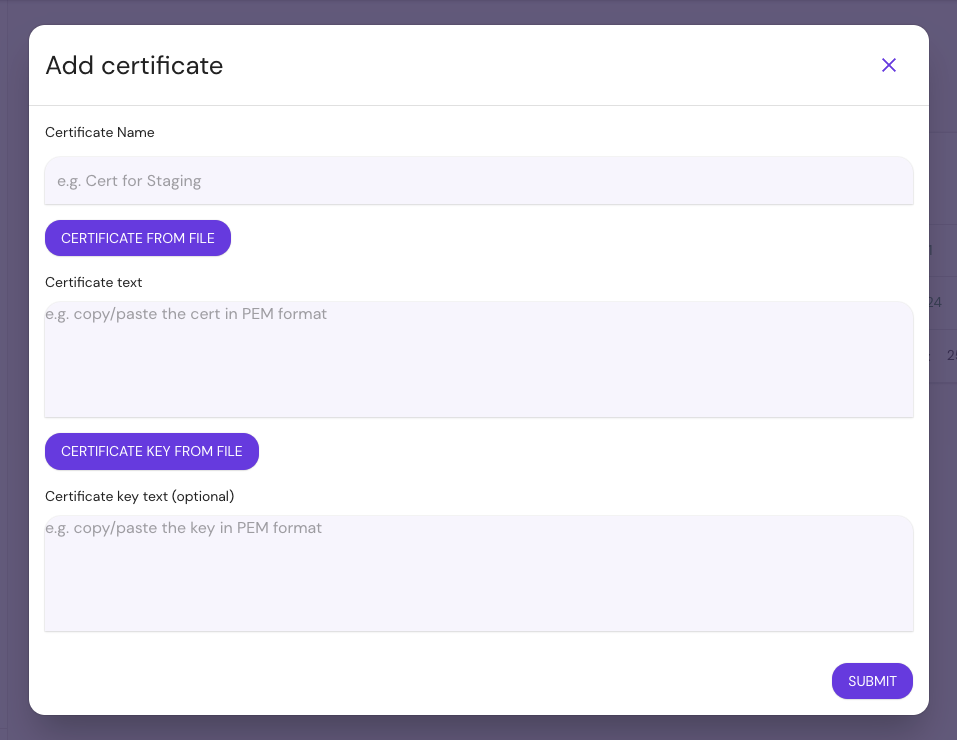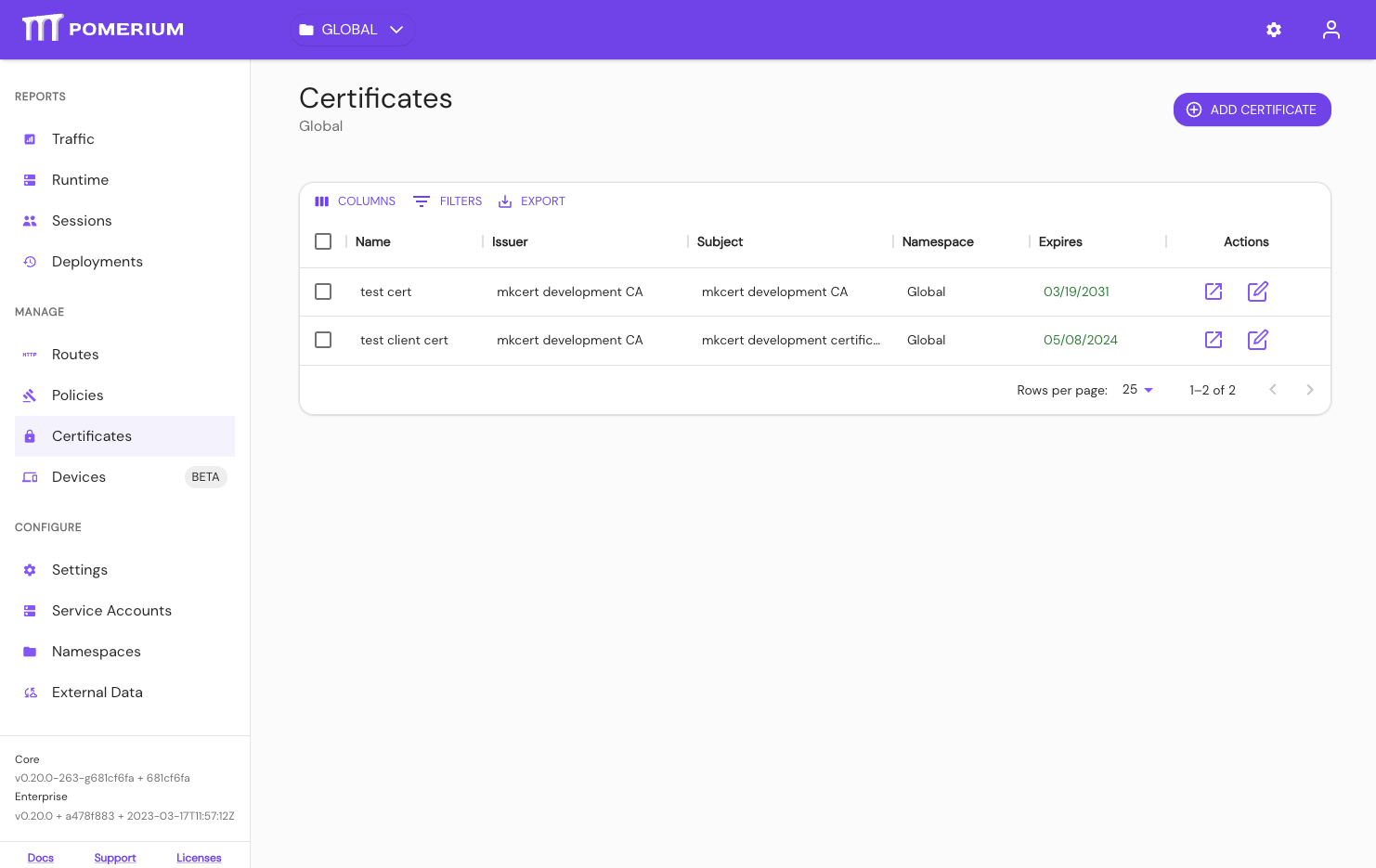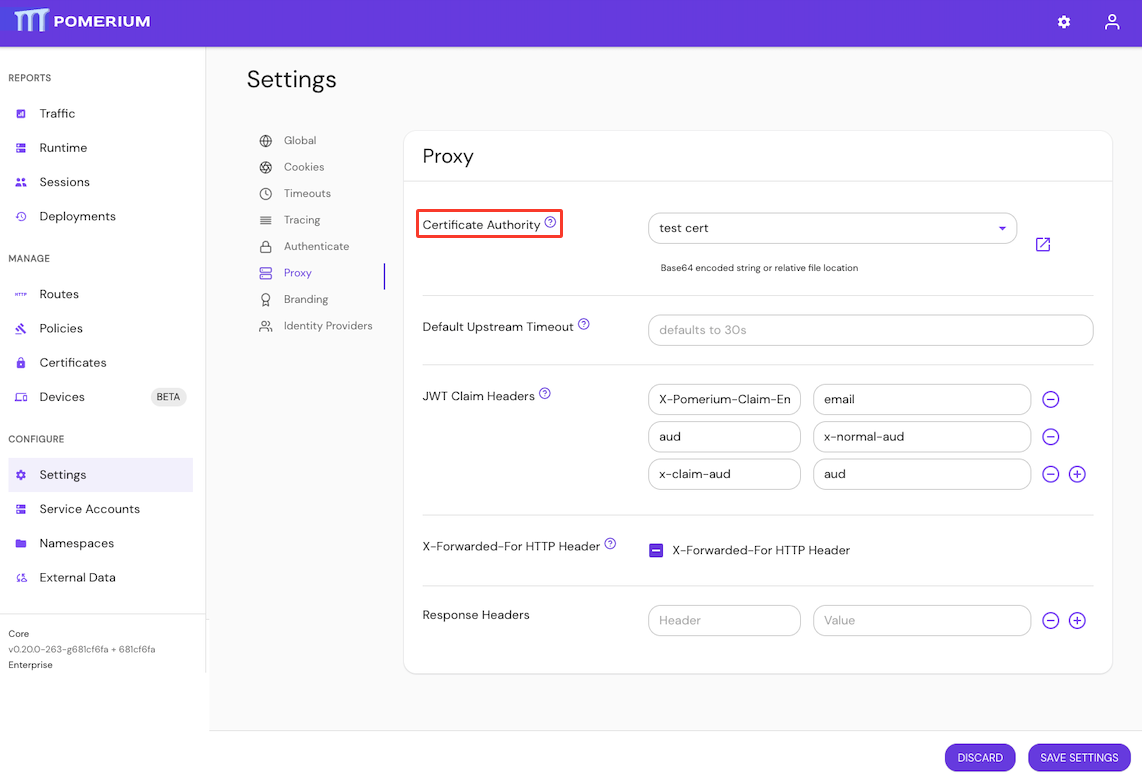Certificates Settings
This reference covers all of Pomerium's Certificates Settings:
All certificates supplied to Pomerium must be in PEM format.
Certificates
Certificates are the X.509 public-key and private-key pair used to establish secure HTTP and gRPC connections. Any combination of these settings can be used together and are additive. You can also use any of these settings in conjunction with Autocert to get OCSP stapling.
Certificates loaded into Pomerium from these config values are used to attempt secure connections between end-users and services, between Pomerium services, and to upstream endpoints.
Pomerium will check your system's trust/key store for valid certificates first. If your certificate solution imports into the system store, you don't need to also specify them with these configuration keys.
How to configure
- Core
- Enterprise
- Kubernetes
| Config file keys | Environment variables | Type | Usage |
|---|---|---|---|
certificates | Not settable as environment variable | string (Array of relative file locations for multiple certificates) | required (if insecure not set) |
certificate and certificate_key | CERTIFICATE and CERTIFICATE_KEY | string (base64-encoded string) | required (if insecure not set) |
certificate_file and certificate_key_file | CERTIFICATE_FILE and CERTIFICATE_KEY_FILE | string (Relative file location for a single certificate) | required (if insecure not set) |
Add Certificates in the Enterprise Console:

View Certificates:

Spec:
Certificates: pomerium/wildcard-localhost
See Kubernetes Ingress Configuration for more information.
Examples
Specify multiple certificates at once:
# Array of relative file locations for multiple certs
certificates:
- cert: '$HOME/.acme.sh/authenticate.example.com_ecc/fullchain.cer'
key: '$HOME/.acme.sh/authenticate.example.com_ecc/authenticate.example.com.key'
- cert: '$HOME/.acme.sh/verify.example.com_ecc/fullchain.cer'
key: '$HOME/.acme.sh/verify.example.com_ecc/verify.example.com.key'
- cert: '$HOME/.acme.sh/prometheus.example.com_ecc/fullchain.cer'
key: '$HOME/.acme.sh/prometheus.example.com_ecc/prometheus.example.com.key'
Set a single certificate and key covering multiple domains and/or a wildcard subdomain:
# Relative file location for a single cert
certificate_file: '$HOME/.acme.sh/*.example.com/fullchain.crt'
certificate_key_file: '$HOME/.acme.sh/*.example.com/*.example.com.key'
All certificates supplied to Pomerium must be in PEM format.
Certificate Authority
Certificate Authority defines a set of root certificate authorities (CAs) that Pomerium uses when communicating with other TLS-protected services.
Unlike route-specific CA settings, this setting augments (rather than replaces) the system's trust store. Routes that specify a CA will ignore those provided here.
Be sure to include the intermediary certificate.
How to configure
- Core
- Enterprise
- Kubernetes
| Config file keys | Environment variables | Type | Usage |
|---|---|---|---|
certificate_authority | CERTIFICATE_AUTHORITY | string | optional |
certificate_authority_file | CERTIFICATE_AUTHORITY_FILE | string | optional |
Configure Certificate Authority in the Enterprise Console:

Kubernetes does not support certificate_authority
Examples
# config file key
certificate_authority: base64-encoded-string
# environment variable
CERTIFICATE_AUTHORITY_FILE=/relative/file/location
Client Certificate Authority
This setting is deprecated; it has been moved to a new Downstream mTLS Settings group (see the Certificate Authority setting there).
This setting will be treated as an alias for the new setting, but will be removed in a future Pomerium release.
Client Certificate Authority is the X.509 public-key used to validate mTLS client certificates.
If not set, no client certificate will be required.
How to configure
- Core
- Enterprise
- Kubernetes
| Config file keys | Environment variables | Type | Usage |
|---|---|---|---|
client_ca | CLIENT_CA | string | optional |
client_ca_file | CLIENT_CA_FILE | string | optional |
client_ca and client_ca_file are bootstrap configuration settings and are not configurable in the Console.
Kubernetes does not support client_certificate_ca
Examples
client_ca: base64-encoded-string
client_ca_file: base64-encoded-string
CLIENT_CA=/relative/file/location
CLIENT_CA_FILE=/relative/file/location